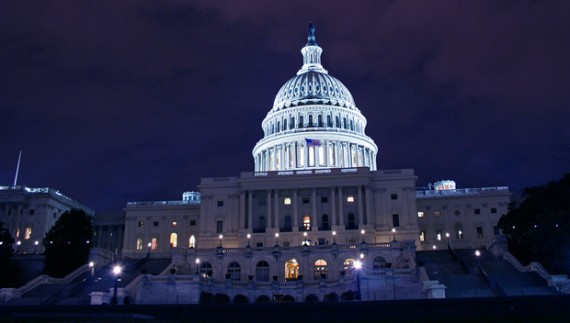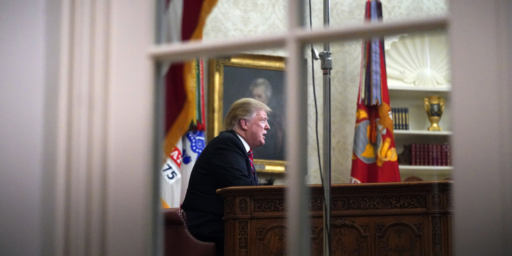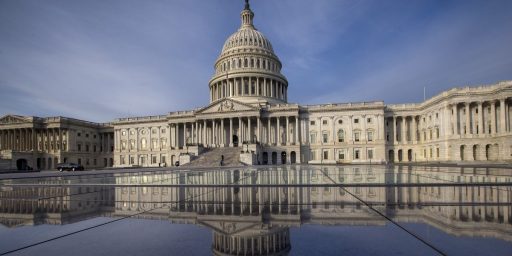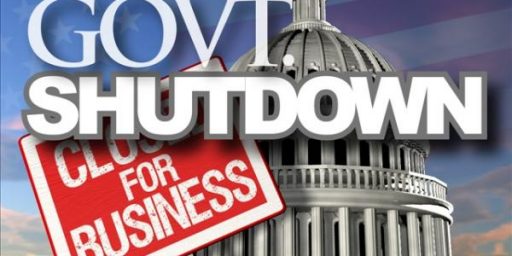In The Event Of A Shutdown, Both Sides Would Get Blamed
If the Republicans and Democrats looked at the polls, they’d see it’s in both their interests to avoid a government shutdown:
With an April 8 deadline approaching for a possible shutdown of the federal government, the public remains divided over whether congressional Republicans or the Obama administration would be more to blame if a shutdown occurs.
Currently, 39% say Republicans would be more to blame if the two sides cannot agree on a budget and the government shuts down, 36% say the Obama administration, and 16% volunteer both sides.
These opinions are little changed from late February. However, opinions are far different now than they were during a similar dispute in 1995, shortly before the government did shut down. In November 1995, a few days before the government shut down, 46% said it would be mainly the Republicans’ fault while 27% said the Clinton administration would be more at fault, according to a Washington Post/ABC News survey.
The latest national survey by the Pew Research Center for the People & the Press, conducted March 30-April 3 among 1,507 adults, finds that most (55%) want the lawmakers they agree with on this issue to be more willing to compromise, even if it means they pass a budget they disagree with. Far fewer (36%) want the lawmakers they agree with to stand by their principles, even if it means the government shuts down.
Republicans are divided over whether to stand on principle or accept a budget they disagree with. Half of Republicans (50%) say lawmakers who share their views should stand by their principles even if that means the government shuts down; 43% say lawmakers should be more willing to compromise, even if that results in a budget they disagree with.
Most conservative Republicans (56%) favor lawmakers standing by their principles, even if that leads to a government shutdown. Just 37% of moderate and liberal Republicans favor this approach.
(….)
Democrats are far more unified: 69% say lawmakers who share their views should be more willing to compromise, even if that means they pass a budget they disagree with. There are no substantive differences in the views of liberal Democrats and the party’s conservatives and moderates. Independents also say lawmakers should be more willing to compromise (by 53% to 38%).
Not surprisingly, there’s one group that feels very differently:
Among all Republicans and Republican-leaning independents, fully 68% of those who agree with the Tea Party say lawmakers who share their views should stand by their principles, even if it means the government shuts down. That compares with just 35% of Republicans and GOP leaners who have no opinion of the Tea Party or disagree with the movement.
In a rational world, both sides would meet in the middle and make a deal. We are not, however, living in a rational world at the moment and the GOP’s need to appease the Tea Party may just be enough to send us all over the cliff on Friday.






Or, in other words, Democrats (39% of those polled) would blame Republicans while Republicans (36% of those polled) would blame Obama. The other 16% are waiting for Entertainment Tonight to inform them that there might be a government shutdown before they feel qualified to express an opinion.
I mean really, what did you expect a poll to reveal?
I suspect that if it comes to pass the republicans will regret it. these kinds of things seem to converge towards conventional wisdom, probably as low information people are told about what happened before and decide that they think that’s what is happening again. If I’m right an actual shutdown and the resultant mainstream talk about 1996 will swing a number of people to blaming the GOP simply because that’s the narrative.
I happen to think that’s also a pretty fair assessment but I don’t really think most people will reach that conclusion for logical reasons.
“In a rational world, both sides would meet in the middle and make a deal.”
I would say that in a rational world, both sides would make arguments based on the expected present value of lifetime benefits and costs of policy proposals. (http://economistsview.typepad.com/economistsview/2011/04/the-smart-way-to-cut-the-budget-deficit.html)
If, for example, the marginal benefits of tax-funded vaccinations for some percentage of the population exceed their costs, reducing the funding below that level would hurt, not help.
The Democrats refused to pass a budget when they were in power. Now the Democrats are blocking the Republicans from passing a budget. So it is all the Republicans faults, right.